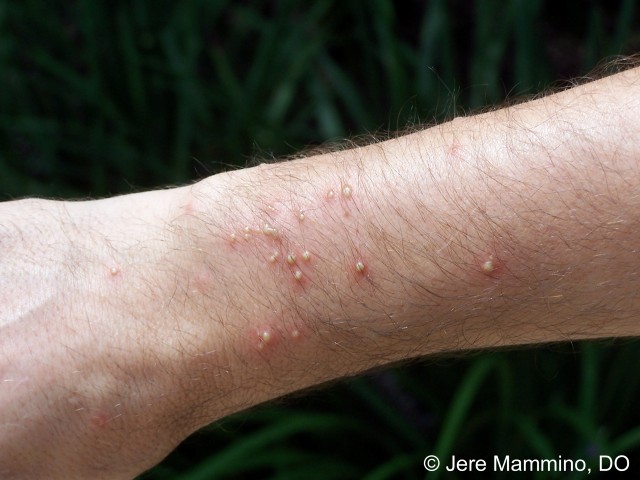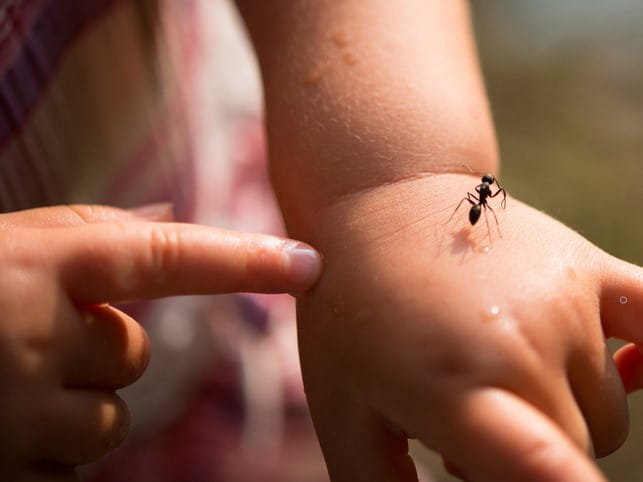To help reduce ant bite swelling, try taking an oral antihistamine to alleviate itchiness and apply hydrocortisone cream on the affected skin to reduce itchiness and rash. Additionally, using cold compresses can help with pain and swelling.

Credit: www.aocd.org
Recognizing Ant Bite Symptoms
Ant bites can cause swelling and discomfort. To help reduce ant bite swelling, consider using cold compresses and over-the-counter antihistamines. Additionally, applying hydrocortisone cream and keeping the affected area clean can aid in alleviating itchiness and inflammation.
Signs Of An Ant Bite
Ant bites can manifest as redness, swelling, and itchiness at the bite site. Often, you may observe a small puncture mark on the skin where the ant injected its venom. Pain and discomfort are common reactions after being bitten. In some cases, small raised bumps or blistering may occur.Allergic Reactions To Ant Bites
Allergic reactions to ant bites can vary from mild itching and swelling to severe anaphylaxis. Symptoms of severe reactions include difficulty breathing, tightening of the throat, dizziness, and rapid heartbeat. Those with allergies to ant venom must seek immediate medical attention if these symptoms occur.It is essential to be vigilant for any unusual or severe symptoms after an ant bite. Prompt recognition of these signs can help in timely intervention and management of ant bite reactions.
Credit: www.poison.org
First Aid For Ant Bites
If you’re looking for first aid for ant bites, there are some home remedies that may help alleviate the swelling and discomfort. Here are a few options:
- Apply a cold compress or ice pack to the affected area. This can help reduce pain and swelling.
- Wash the bite with soap and water to help prevent infection.
- Take an over-the-counter antihistamine, such as Benadryl, to help reduce itching and inflammation.
- Apply a hydrocortisone cream on the bite twice a day to help alleviate itching and the rash.
- In the absence of baking soda, you can try dissolving some salt in water and using it as a compress to reduce swelling.
If home remedies are not providing enough relief, you may consider using over-the-counter medications. Here are a few options you can try:
- Over-the-counter antihistamines can help reduce the initial effects of the ant bite, such as itching and inflammation.
- Hydrocortisone cream can also be applied to the affected area to ease pain and swelling.
- If the swelling is severe or accompanied by an allergic reaction, it is important to seek medical attention immediately.
Remember, if symptoms worsen or persist, it is essential to consult a healthcare professional for further evaluation and treatment.
Reducing Swelling And Itching
When it comes to dealing with ant bite swelling, it’s important to take immediate action to reduce both the swelling and the itching. Here are a few effective methods that can help alleviate these symptoms:
Applying Cold Compress
One of the easiest and most immediate ways to reduce swelling and itching caused by ant bites is by applying a cold compress to the affected area. This can be done by wrapping a few ice cubes in a thin cloth or towel and gently pressing it against the bite. The cold temperature helps to constrict blood vessels, reducing inflammation and swelling. Remember to never apply ice directly to the skin, as it can cause damage. Instead, use a barrier like a cloth or towel for protection.
Taking Antihistamines Or Corticosteroids
Another effective way to alleviate swelling and itching is by taking antihistamines or corticosteroids. Antihistamines can help to reduce the body’s reaction to the ant bite, relieving itching and inflammation. Over-the-counter antihistamines, such as Benadryl, can be taken orally. Alternatively, corticosteroid creams or ointments can be applied topically to the affected area to reduce inflammation and relieve itching. However, it is important to consult with a healthcare professional before using corticosteroids, as they may have potential side effects.
To summarize, reducing ant bite swelling and itching can be achieved through the application of a cold compress or the use of antihistamines and corticosteroids. These methods can provide immediate relief and promote the healing process. Remember to consult with a healthcare professional for proper guidance and advice on the best course of action for your specific situation.
Professional Treatment Options
Prescription-strength Medications
If the ant bite swelling persists and over-the-counter remedies provide no relief, prescription-strength medications may be necessary. Oral corticosteroids like prednisone can help diminish severe swelling and allergic reactions. Additionally, prescription-strength steroid creams or ointments can be applied topically to alleviate discomfort.
Seeking Medical Attention
If the swelling continues to worsen or you experience symptoms of an allergic reaction such as difficulty breathing or a rapid heartbeat, seeking immediate medical attention is crucial. At the medical facility, you may receive an epinephrine injection to counteract severe allergic responses and alleviate symptoms swiftly.
Preventing Future Ant Bites
To help reduce ant bite swelling, apply hydrocortisone cream twice daily and use cold compresses as needed. Oral antihistamines like Benadryl can alleviate itchiness and over-the-counter creams can ease pain and swelling. It’s also beneficial to wash the area to prevent infection and consider salt if baking soda is unavailable for reducing swelling.
Effective Home Pest Control
If you want to prevent future ant bites, it’s essential to address the root of the problem by implementing effective home pest control measures. This includes keeping your living space clean and free of food debris that may attract ants. Sealing cracks and crevices in your home’s foundation and regularly disposing of garbage in tightly sealed containers can also help in keeping ants at bay. Additionally, using natural ant deterrents such as peppermint, cinnamon, vinegar, or citrus peels in areas frequented by ants can help prevent them from entering your living space.
Identifying Fire Ant Nests
One crucial step in preventing future ant bites is to identify and eliminate fire ant nests in your vicinity. Fire ants are often found in sunny and well-drained areas, such as lawns, gardens, and around buildings. By identifying these mounds of loose soil, typically with no obvious entrance, you can take the necessary steps to eliminate them. To do so, you can use baits, insecticide drenches, or seek professional help to eradicate these nests from your surroundings.

Credit: www.homepest.com
Frequently Asked Questions Of How To Help Ant Bite Swelling
How Long Does Ant Bite Swelling Last?
Ant bite swelling typically lasts for a few hours to a couple of days. Using cold compresses and taking antihistamines can help reduce pain and swelling associated with ant bites.
What Is The Fastest Way To Heal Ant Bites?
To heal ant bites quickly, take an oral antihistamine like Benadryl to reduce itchiness. Apply hydrocortisone cream twice a day and use cold compresses to reduce pain and swelling. Wash the affected area and avoid infection. Avoid starting sentences with “when it comes to” or “if you.
“
Does Benadryl Help With Ant Bites?
Benadryl can help alleviate ant bite itchiness. Using hydrocortisone cream and cold compresses can also reduce pain and swelling effectively.
Why Do Red Ant Bites Swell So Much?
Red ant bites swell due to the allergic reaction they cause. The surrounding area may swell, burn, or itch, with some people experiencing severe reactions. Anaphylaxis is less common but can be life-threatening.
Conclusion
Dealing with ant bite swelling? Ease discomfort with antihistamines, hydrocortisone cream, and cold compresses. Swift relief is possible!

I’m MD Tanvir, and I bring years of expertise gained from working closely with pest control companies to the forefront. My journey in the industry has inspired me to launch Bug Battler, a platform aimed at equipping people with the know-how to combat pests autonomously. Through Bug Battler, I aim to empower individuals with practical insights to tackle pest infestations effectively.

